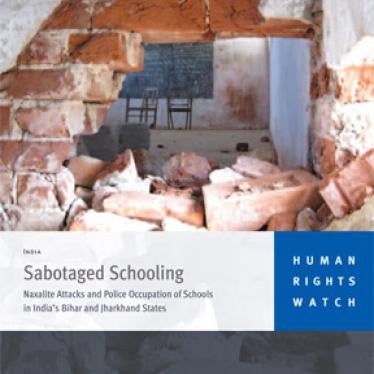(New York) - Maoist militants and Indian authorities should protect both schools and children's access to education during the upcoming Bihar state elections, Human Rights Watch said today. The use of schools by government police and paramilitary forces as bases during the election campaign can disrupt students' access to education and may increase the likelihood of Maoist attacks on schools, Human Rights Watch said.
India's Election Commission announced on September 6, 2010, that it would hold elections for Bihar's 243-seat legislative assembly in six phases beginning October 21, 2001. A key reason for holding the election in six phases was the need to deploy security forces around the state to prevent anticipated violence from the Maoists. Human Rights Watch called upon the Maoists, also known as Naxalites, to end attacks on schools and for government authorities to consider alternatives before deploying security forces in educational facilities.
"We've seen time and again that the Maoists step up violence, and particularly their attacks on schools, during national and local election periods," said Bede Sheppard, senior children's rights researcher at Human Rights Watch. "Whatever the impact of Maoist school attacks on the elections, the long-term damage to children whose schools are destroyed is far greater."
Human Rights Watch documented that during local assembly elections in neighboring Jharkhand state in 2009, the Maoists bombed at least 21 government schools in the month prior to the first day of voting, on November 25, up to the last day, on December 18. In 2009, Maoists attacked at least 23 schools in Bihar.
"The government should be prepared to respond to any attack on a school," Sheppard said. "They should have a plan ready to ensure that temporary facilities and replacement education materials are available immediately."
During campaigns, government police and paramilitary forces frequently occupy school buildings as bases, generally for a few days. Local media reports typically explain Maoist attacks on schools as responses to this use of schools by the security forces. Pamphlets left by the Maoists at some bombed schools in Jharkhand during the local elections in 2009 sought to justify the attacks as an attempt to pre-empt the building's use by security forces.
However, the Maoists also attacked schools to disrupt the elections. At some of those schools in Jharkhand, pamphlets and graffiti slogans from the Maoists urged local residents to boycott the elections. Some schools targeted by the Maoists were to have been used as polling stations.
Aside from election periods, government security forces have also occupied some school buildings for several month and even years, severely disrupting education. In July, the Ministry for Human Resource Development - India's education ministry - wrote to all states affected by the Maoist conflict, asking that security forces occupying government schools vacate them at the earliest possible time and for schools damaged by the Maoists to be rebuilt.
"While the Maoists must take the blame for destroying schools, the security forces should also carefully assess whether their use of schools as temporary bases puts these facilities - and the children whose future depends on them - in unnecessary peril," Sheppard said.







